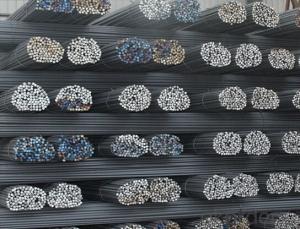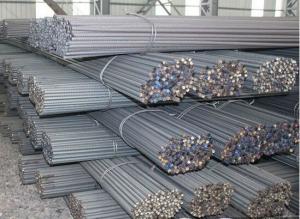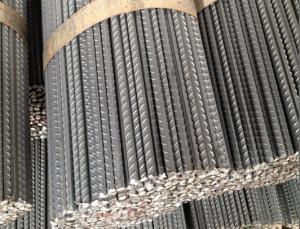Round Bar and Deformed Bar Grade 460A_460B
- Loading Port:
- Tianjin
- Payment Terms:
- TT OR LC
- Min Order Qty:
- 50 m.t.
- Supply Capability:
- 10000 m.t./month
OKorder Service Pledge
OKorder Financial Service
You Might Also Like
Item specifice
Round Bar and Deformed Bar Grade 460A_460B
Details of Round Bar and Deformed Bar Grade 460A_460B
Name | Deformed Bar |
Shape | Round Bar |
Standard | 1.GB1499.2-2007, HRB335, HRB400E 2. ASTM A615 Gr.40, Gr.60 3.BS4449/1997 |
Diameter | 6mm-50mm |
Length | 6m, 8m, 9m,12m as standard or as request |
Test | SGS/UT 100% Elements Testing |
Certificate: | ISO/Mill Certificate |
Service: | 24 hours online service / |
more than 20 years trading and manufacture | |
Quality Assurance: | the third party inspection, such as SGS, BV, TUV…etc. is acceptable |
Packaging Details: | Seaworthy Packaging or as per customer's packing instruction |
Specification of Round Bar and Deformed Bar Grade 460A_460B
Standard | Grade | Yield Strength Mpa | Tensile Strength | Elongation% |
BS4449:1997 | 250 | 250 | 295 | 22 |
460A | 460 | 485 | 12 | |
460B | 460 | 500 | 15 | |
GB1499.2-2007 | HRB335/335E | 335 | 455 | 17 |
HRB400/400E | 400 | 540 | 17 | |
HRB500/500E | 500 | 630 | 16 | |
ASTM A615 & A615M-04a | GRADE40 | 280 | 420 | 12 |
GRADE60 | 420 | 620 | 9 | |
GRADE75 | 520 | 690 | 7 | |
JIS G3112-2004 | SD295A | ≥ 295 | 440-600 | 17 |
SD295B | 295-390 | ≥ 440 | 17 | |
SD345 | 345-440 | ≥490 | 19 | |
SD390 | 390-510 | 560 | 17 | |
SD490 | 490-625 | ≥ 620 | 13 |
Size | WEIGHT | WEIGHT | QUANTITY | ||
LENGTH 6M | LENGTH 12M | LENGTH 6M | LENGTH 12M | ||
6 | 0.222 | 1.332 | 2.664 | 751 | 375 |
8 | 0.395 | 2.37 | 4.74 | 422 | 211 |
10 | 0.617 | 3.702 | 7.404 | 270 | 135 |
12 | 0.888 | 5.328 | 10.656 | 188 | 94 |
14 | 1.21 | 7.26 | 14.52 | 138 | 69 |
16 | 1.58 | 9.48 | 18.96 | 106 | 53 |
18 | 2 | 12 | 24 | 83 | 42 |
20 | 2.47 | 14.82 | 29.64 | 67 | 34 |
22 | 2.98 | 17.88 | 35.76 | 56 | 28 |
25 | 3.85 | 23.1 | 46.2 | 43 | 22 |
28 | 4.83 | 28.98 | 57.96 | 35 | 17 |
32 | 6.31 | 37.86 | 75.72 | 26 | 13 |
36 | 7.99 | 47.94 | 95.88 | 21 | 10 |
40 | 9.87 | 59.22 | 118.44 | 17 | 8 |
50 | 15.42 | 92.52 | 185.04 | 11 | 5 |
CNBM Introduction of Round Bar and Deformed Bar Grade 460A_460B Supplier
CNBM International Corporation is the most import and export platform of CNBM group(China National Building Material Group Corporation) ,which is a state-owned enterprise, ranked in 270th of Fortune Global 500 in 2015.
With its advantages, CNBM International are mainly concentrate on Cement, Glass, Iron and Steel, Ceramics industries and devotes herself for supplying high quality series of refractories as well as technical consultancies and logistics solution.
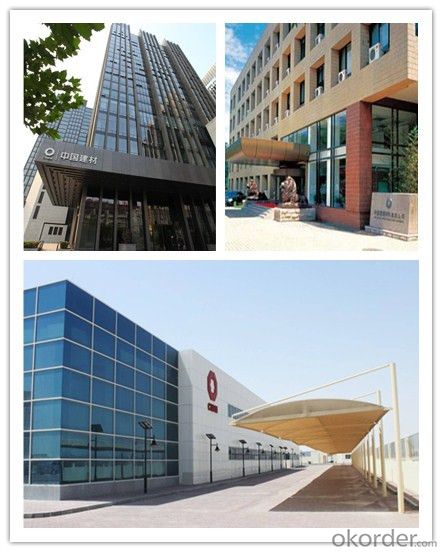
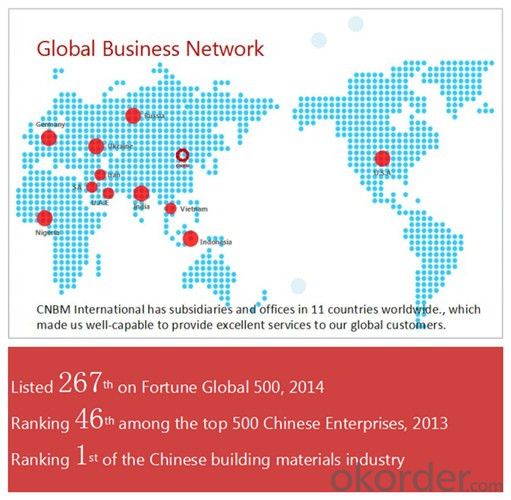
Packaging & Delivery of Round Bar and Deformed Bar Grade 460A_460B
Packaging Detail | Sea worthy packing /as per customer's packing instruction |
Delivery Detail | 15 ~ 40 days after receiving the deposit |
Products Show
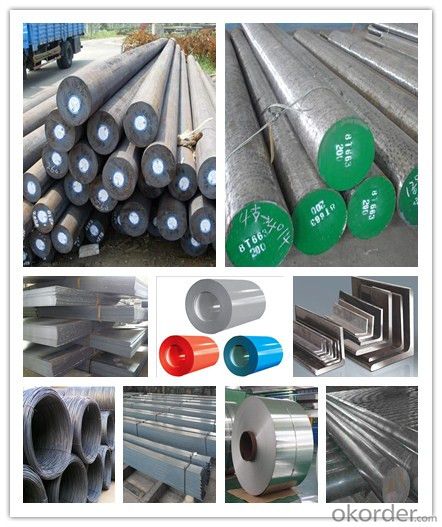
FAQ:
Are you a trading company or manufacturer? | Manufacturer |
What’s the MOQ? | 3 metric ton |
What’s your delivery time? | 15-35 days after downpayment received |
Do you Accept OEM service? | Yes |
what’s your delivery terms? | FOB/CFR/CIF |
What's the Payment Terms? | 30% as deposit,70% before shipment by T/T |
Western Union acceptable for small amount. | |
L/C acceptable for large amount. | |
Scrow ,Paybal,Alipay are also ok | |
Why choose us? | Chose happens because of quality, then price, We can give you both. Additionally, we can also offer professional products inquiry, products knowledge train (for agents), smooth goods delivery, excellent customer solution proposals. |
What's your available port of Shipment? | Main Port, China |
What’s your featured services? | Our service formula: good quality+ good price+ good service=customer's trust
|
Where are your Market? | Covering more than 160 countries in the world |
- Q:What are the different tempering techniques used for special steel?
- There are several tempering techniques used for special steel, including air tempering, oil tempering, water tempering, and salt bath tempering. Each technique involves heating the steel to a specific temperature and then cooling it at a controlled rate to achieve desired hardness, strength, and other mechanical properties.
- Q:Can special steel be used in the renewable energy industry?
- Yes, special steel can be used in the renewable energy industry. Special steel, such as corrosion-resistant or high-strength steel, can be employed in various applications within the renewable energy sector. For instance, it can be used in the manufacturing of wind turbine components, solar panel frames, and hydroelectric infrastructure. The unique properties of special steel make it suitable for withstanding harsh environmental conditions and ensuring long-term durability and performance in renewable energy systems.
- Q:What are the different surface cleaning methods for special steel?
- There are several surface cleaning methods for special steel, including mechanical cleaning, chemical cleaning, and electrochemical cleaning. Mechanical cleaning involves using abrasive materials or tools to physically remove dirt, rust, or other contaminants from the steel's surface. Chemical cleaning involves using specialized cleaning agents or solvents to dissolve and remove any unwanted substances. Electrochemical cleaning utilizes an electric current and specific electrolytes to remove dirt and corrosion from the steel's surface. Each method has its advantages and is chosen based on the specific requirements and condition of the special steel.
- Q:What are the different marine grades of special steel?
- There are several marine grades of special steel commonly used in marine applications. Some of the most widely known grades include 316, 316L, and 2205. These grades are specifically designed to resist corrosion and maintain their strength and integrity in harsh marine environments. Additionally, other grades such as 304 and 904L are also used in marine applications for their corrosion resistance properties.
- Q:How does special steel compare to other materials?
- Special steel is known for its exceptional strength, durability, and resistance to corrosion, making it superior to many other materials. Its unique composition and manufacturing processes result in improved performance, higher load-bearing capacity, and enhanced safety compared to other materials. Additionally, special steel offers excellent heat resistance, making it suitable for a wide range of applications, including automotive, construction, and aerospace industries.
- Q:What are the properties of high-temperature stainless steel?
- High-temperature stainless steel possesses excellent heat resistance, corrosion resistance, and mechanical strength even at elevated temperatures. It retains its structural integrity and is capable of withstanding extreme thermal conditions, making it suitable for various high-temperature applications such as in aerospace, power generation, and chemical industries.
- Q:What is the impact of impurities on the machinability of special steel?
- The impact of impurities on the machinability of special steel can be significant. Impurities in the steel, such as sulfur, phosphorus, and non-metallic inclusions, can adversely affect the performance and machinability of the material. Sulfur is commonly present in steel as an impurity, and it tends to form brittle compounds that can reduce the machinability of the steel. High levels of sulfur can lead to increased tool wear, poor surface finish, and decreased cutting tool life. Therefore, it is essential to control the sulfur content in special steel to ensure good machinability. Phosphorus is another impurity that can have a negative impact on machinability. It tends to form hard and brittle compounds, which can cause tool chipping, breakage, and poor chip control. High levels of phosphorus can also lead to reduced cutting tool life and surface finish. Non-metallic inclusions, such as oxides, sulfides, and silicates, are also significant impurities in steel. These inclusions can act as stress concentrators, leading to increased tool wear and decreased machining quality. Large inclusions can cause tool breakage and interrupt the machining process. Therefore, minimizing the presence of non-metallic inclusions is crucial for improving the machinability of special steel. Overall, impurities in special steel can have a detrimental effect on its machinability. To ensure good machinability, it is important to control and minimize the levels of impurities like sulfur, phosphorus, and non-metallic inclusions. This can be achieved through careful selection of raw materials, refining processes, and quality control measures during the manufacturing of special steel.
- Q:What are the specific requirements for special steel used in the marine shafting industry?
- The specific requirements for special steel used in the marine shafting industry include high strength, excellent corrosion resistance, and good weldability. The steel must also have good fatigue resistance to withstand the constant loading and vibrations experienced in marine environments. Additionally, it should have low magnetic permeability to minimize interference with navigation systems.
- Q:What are the characteristics of special stainless steel?
- Special stainless steel distinguishes itself from regular stainless steel through its exceptional properties. Some of the notable traits of this type of stainless steel are as follows: 1. Unparalleled Resistance to Corrosion: Unlike regular stainless steel, special stainless steel boasts a higher degree of corrosion resistance. It can endure exposure to harsh surroundings, such as saltwater or acidic substances, without undergoing corrosion or deterioration. 2. Impressive Endurance of High Temperatures: Special stainless steel is engineered to withstand elevated temperatures without compromising its structural integrity. This makes it suitable for industries like aerospace, automotive, and power generation, where extreme heat endurance is essential. 3. Reinforced Strength and Durability: Special stainless steel is commonly alloyed with other elements to enhance its strength and durability. Consequently, it exhibits remarkable resistance to deformation, cracking, and wear, ensuring its longevity and reliability in demanding conditions. 4. Exceptional Mechanical Properties: Special stainless steel possesses outstanding mechanical properties, including high tensile strength, toughness, and ductility. These properties make it an ideal choice for applications that require a high load-bearing capacity, such as structural components and machinery. 5. Distinctive Magnetic Properties: Depending on its composition, special stainless steel can display a range of magnetic properties, varying from non-magnetic to highly magnetic. This versatility enables its use in applications that demand magnetic properties, such as magnetic resonance imaging (MRI) machines or electrical transformers. 6. Hygienic and Easy to Maintain: Special stainless steel is renowned for its hygienic properties, rendering it suitable for applications in the food and healthcare industries. It is non-porous, resistant to bacterial growth, and easy to clean, making it an ideal choice for equipment and surfaces that must meet stringent sanitary standards. 7. Aesthetic Allure: The aesthetic appeal of special stainless steel often leads to its utilization in architectural and design applications. It can be polished to achieve a mirror-like finish, lending it a sleek and contemporary appearance. Moreover, its malleability and weldability allow for limitless creative design possibilities. In conclusion, special stainless steel possesses an array of exceptional properties, encompassing high corrosion resistance, temperature resistance, strength, durability, excellent mechanical properties, unique magnetic properties, hygienic features, and aesthetic appeal. These characteristics position it as the preferred choice for a wide range of industrial, commercial, and domestic applications.
- Q:How does special steel contribute to the wear resistance of products?
- Special steel contributes to the wear resistance of products in several ways. Firstly, special steel is known for its high strength and hardness, which allows it to withstand heavy loads and resist deformation. This property is crucial in applications where products are subjected to abrasive forces or repetitive stress, such as in machinery parts or cutting tools. Additionally, special steel often contains specific alloying elements that enhance its wear resistance. For example, the addition of chromium can form a protective layer of chromium oxide on the surface of the steel, which acts as a barrier against corrosion and wear. Similarly, the addition of vanadium or molybdenum can increase the steel's hardness and toughness, making it more resistant to wear and fatigue. Moreover, special steel can be heat-treated to further enhance its wear resistance. Through processes like quenching and tempering, the steel's microstructure can be modified to achieve a fine-grained and homogeneous structure. This results in improved hardness and increased resistance to wear, as well as better dimensional stability. In summary, special steel contributes to the wear resistance of products due to its inherent strength and hardness, alloying elements that enhance wear resistance, and the ability to be heat-treated for improved properties. These characteristics make special steel an excellent choice for applications where durability and longevity are crucial.
1. Manufacturer Overview |
|
|---|---|
| Location | |
| Year Established | |
| Annual Output Value | |
| Main Markets | |
| Company Certifications | |
2. Manufacturer Certificates |
|
|---|---|
| a) Certification Name | |
| Range | |
| Reference | |
| Validity Period | |
3. Manufacturer Capability |
|
|---|---|
| a)Trade Capacity | |
| Nearest Port | |
| Export Percentage | |
| No.of Employees in Trade Department | |
| Language Spoken: | |
| b)Factory Information | |
| Factory Size: | |
| No. of Production Lines | |
| Contract Manufacturing | |
| Product Price Range | |
Send your message to us
Round Bar and Deformed Bar Grade 460A_460B
- Loading Port:
- Tianjin
- Payment Terms:
- TT OR LC
- Min Order Qty:
- 50 m.t.
- Supply Capability:
- 10000 m.t./month
OKorder Service Pledge
OKorder Financial Service
Similar products
New products
Hot products
Related keywords
